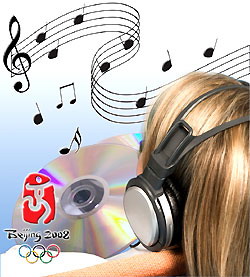While the use of music has been a global issue for years in the fight for protection of intellectual property, the challenge is now close to home as organizers of the Beijing Olympic Games move to ensure that all songs played at the event are fully authorized.

The Beijing Organizing Committee for the Games of the XXIX Olympiad (BOCOG) last month signed music copyright authorization documents with the Music Copyright Society of China (MCSC).
Under the agreement, BOCOG will pay for the use of all music used at the Beijing Games when the copyrights belong to others.
It is estimated the Games will include nearly 10,000 works of music used at the opening and closing ceremonies, cultural events, at sports venues, and during medal presentation ceremonies.
The MCSC is a member of the International Confederation of Authors and Composers Societies and the only organization on the mainland that manages music copyrights.
It protects the works of nearly 5,000 composers and has signed contracts with more than 50 countries and regions throughout the world that together manage the copyrights of over 14 million works of music.
"BOCOG has made a great effort in intellectual property rights protection and protecting copyrights is an important part of this," says Liu Yan, deputy director of the BOCOG legal affairs department.
"There will be a large number and variety of musical works used at the Olympic Games, which makes our task more difficult. The MCSC has rich experience in music copyright management, which will help enormously."
According to Liu, the BOCOG was in discussions with the MCSC for nearly a year.
All the Olympics songs that are selected by the BOCOG are an important part of the overall protection plan.
"The MCSC will help promote the Olympics songs and protect the music copyrights with all of our resources to ensure the rights of interests of all copyright owners," says Qu Jingming, director-general of the MCSC.
Beginning the effort in 2003, the BOCOG has since selected 34 Olympics songs. Another selection campaign is now underway, with the results to be announced at the 100-day countdown to the opening of the Games. Copyrights of those songs will belong to the BOCOG and the MCSC will have to ensure they are issued, performed or played in public properly.
In addition to music copyrights, the BOCOG has made extensive efforts to protect other Olympics intellectual properties, Liu says, including the Olympics emblem, mascots, slogans, photographs and the torch relay logo.
As early as 2000 in the bidding process for the Games, the State Administration for Industry and Commerce of China promised to the International Olympic Committee (IOC) in a statement that "the Chinese government will made every effort to protect the Olympics-related marks through legal means".
The commitment was also included in Beijing's bidding report, which was submitted to the IOC in January, 2001 and in the host city contract signed with the IOC in July, 2001.
"The commitment has been made, so if we fail to carry it out, the rest of the world will have lower trust for us," says Liu. "An Olympic Games without proper protection of the Olympics marks will not be a successful one."
Over two decades China has established a system of laws for protecting intellectual property and joined 14 international intellectual property protection organizations.
To further ensure efficient protection, Beijing has laid down specific rules on Olympics intellectual property protection.
In line with the Trademark Law of China, the BOCOG has applied for registration for the Beijing 2008 Olympics emblem, known as "Chinese Seal, Dancing Beijing". The registration covers products and services in 45 categories.
"The Olympic Games is a grand sports gala, as well as a big cultural extravaganza, which means creative cultural elements are also important for organizers to protect," says Liu.
"I believe with the support from all society, people will pay much more attention to Olympics intellectual property rights protection."